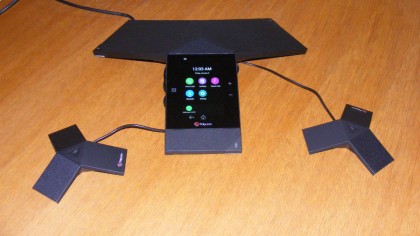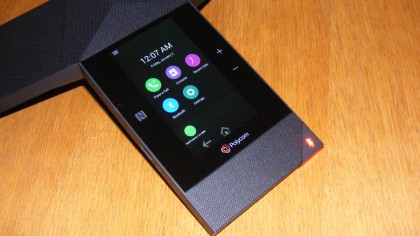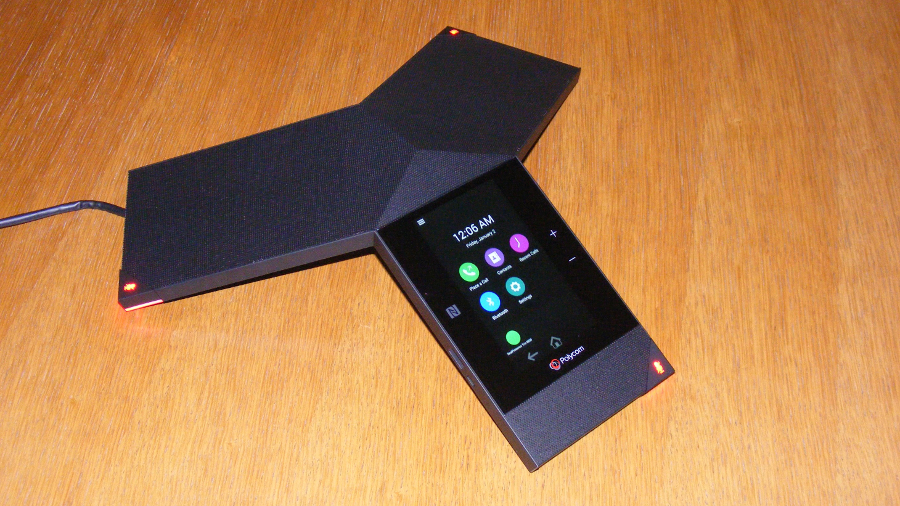Early Verdict
This smart looking device is highly versatile, but the downside is it doesn't come cheap.
Pros
- +
Stylish looking
- +
Works with different platforms
- +
Easy to set up
Cons
- -
Pricey
Why you can trust TechRadar
Remote working, globalisation and multi-site operations all mean that modern businesses rely heavily on conference calls to hold virtual meetings. To do this effectively you need something a bit more sophisticated than a simple speaker phone and there are an increasing number of specialist solutions on the market.
Polycom's RealPresence Trio is a communications hub that can be used for both voice and video calling. It aims to be easy to use and effective as well as stylish enough to grace the boardroom.
The main part of the unit has three arms each of which houses a speaker and a microphone, and one has a full colour 5-inch touchscreen to operate it. It looks smart in a slightly sci-fi sort of way with a smooth matt black finish that won't show finger marks.
The unit is powered via Ethernet – there's an injector included in the kit – and you can use it as a standalone voice conferencing system without any of the extra bits that were supplied with our sample unit (more on those shortly). Wi-Fi and Bluetooth communications are built in, so if you don't have wired Ethernet you can power the Trio with an injector and connect wirelessly, and you can pair to BYOD kit.
Our review package came with a number of extras. There are a pair of optional extension mics to cope with larger rooms or long boardroom tables – these echo the tricorn design of the main unit and have their own mute buttons.

For video calling there's a little Visual+ box that you connect to a monitor – any screen with an HDMI port will do. This has a standard VESA mount so you can attach it to the back of the screen to keep it out of the way. It works with a webcam – a Logitech cam came with our unit – and can handle 1080p video at up to 30 frames per second. The video element is optional though so you can just have the Trio for voice calling without the extra hardware if you wish.
The Trio is a SIP call platform so it's compatible with popular enterprise VoIP platforms like Skype for Business, Lync and RealPresence. Devices like laptops and tablets can be paired via Bluetooth, NFC, USB or local network connection to allow for content sharing, presentations, etc.
Ethernet and extension mic connections are underneath the unit so you can route the cables out of the way to keep your meeting room looking tidy. There's also an extra LAN port under there to attach a local PC. There's a Kensington lock to secure the device as well. Micro and full-size USB ports are located on the side of the display unit so you can easily plug in devices as needed for a meeting. You also get an NFC hotspot on the left next to the screen itself.
So how does this device work in practice? Power it up, connect the Trio to a VoIP client system and you're ready to go. The screen allows you access to your contacts list so you can initiate calls directly from the unit. Microsoft Exchange users also have the option for one-step joining of a conference.

When a call is active there's a green LED on each of the microphones to indicate that they're on. Each arm of the device, and each of the remote mics, has a button which can be used to mute the call (in which case the LEDs turn red).
Plus and minus buttons to the right of the touchscreen allow you to adjust the speaker volume. The screen is bright and nicely responsive allowing you to place a call, access contacts and view call history. You can also access voicemail from whichever platform you're connected to as well as the settings for Bluetooth and networks.
The RealPresence Trio 8800 uses HD audio to deliver rich audio, and since it's a Bluetooth device it's quite happy streaming music from your PC or phone and the sound quality is impressive. Microphone coverage is up to six metres, more with the extra microphones attached. The Trio also has a clever NoiseBlock technology built in that will automatically mute the microphones when there's background noise – like people entering the room or sirens passing in the street – to minimise distractions.
If you want video calling you'll need the Visual+ unit which you pair with the Trio just like any other external network device. It then connects to a screen via an HDMI port. The Visual+ box also has its own LAN, USB and audio connections as well as a Kensington lock to physically secure it. Like the main unit it uses Power over Ethernet, so the two devices communicate via the LAN therefore don't have to be sited close to each other. The USB is used to attach a webcam, and as we mentioned, a Logitech camera was supplied with the unit.
You can share content via a client like Skype for Business simply by selecting share from the client session. However, the device only supports a single stream so if you're sharing your desktop the video part of the call will be lost and will resume when sharing ends.
Early verdict
At around £1,250 (about $1,800, AU$2,500) the Trio isn't cheap but it is versatile. You can use it as a sound system to stream audio, you can turn your mobile into a speakerphone, and you can use it with a soft client on a PC.
It can also be registered directly to Lync or Skype for Business and used as a standalone conference device with no extra devices. If you have a SIP telephony platform it can connect to that and act as a conference phone too. Add Visual+ and you can have full videoconferencing capability.
All things considered then this is a powerful business tool. It looks smart and it offers all of the conference calling facilities most businesses are ever likely to need.
Ian Barker worked in information technology before discovering that writing about computers was easier than fixing them. He has worked for a staff writer on a range of computer magazines including PC Extreme, was editor of PC Utilities, and has written for TechRadar, BetaNews, IT Pro Portal, and LatestGadgets.
What is a hands on review?
Hands on reviews' are a journalist's first impressions of a piece of kit based on spending some time with it. It may be just a few moments, or a few hours. The important thing is we have been able to play with it ourselves and can give you some sense of what it's like to use, even if it's only an embryonic view. For more information, see TechRadar's Reviews Guarantee.
